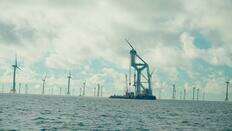- EIB provides a €500 million loan for the Windanker offshore wind farm in the German Baltic Sea.
- The project will generate 315 MW of wind capacity, supplying renewable electricity to 600,000 people annually.
- Construction began with monopile installation; turbine installation is set for 2026, with full commissioning by Q4 2026.
- The project supports EU climate goals and Germany's target of 80% renewable electricity by 2030.

Project Overview
The European Investment Bank (EIB) has granted a €500 million green loan to Iberdrola for the Windanker offshore wind farm in the German Baltic Sea. This project is supported by a guarantee from Cesce, the Spanish export credit agency, marking the first use of this guarantee for Spanish-led green projects outside Spain.
Energy and Employment Impact
Windanker will contribute 315 MW of offshore wind capacity, providing renewable electricity to approximately 600,000 people annually. The project is expected to create around 2,200 person-years of employment during construction and sustain up to 160 skilled permanent jobs in the region.
Technological Advancements
The wind farm will deploy 21 Siemens Gamesa SG 14-236 DD turbines, each capable of up to 15 MW, featuring a 236-meter rotor and direct drive technology. These advancements aim to increase reliability and operational performance, enhancing annual energy production by over 30% compared to previous models.
Timeline and Strategic Goals
Construction began with the installation of the first monopile, and turbine installation is scheduled for 2026, with full commissioning expected in the fourth quarter of 2026. The project aligns with the EIB Group’s TechEU initiative and supports the REPowerEU plan, contributing to the EU's climate action goals and reducing dependence on fossil fuel imports.
Environmental and Economic Contributions
By increasing the share of clean energy in Germany’s grid, Windanker supports European and national goals to reduce carbon emissions and meet climate targets. The project is a significant step in Germany's National Energy and Climate Plan, aiming for an 80% renewable electricity share by 2030.

